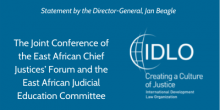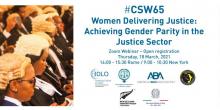Feminist Climate Action and the Rule of Law


Rights mean little if those entitled to them are not aware they exist. Due process is of doubtful value when you are illiterate, or unable to understand the proceedings. Courts are next to worthless for those who cannot afford the bus fare to reach them. Nor should justice be about courts alone. For all these reasons, legal empowerment is crucial. Part of IDLO's bottom-up (or demand side) approach, it involves equipping people with the knowledge, confidence and skills to realize their rights. Even as we work to improve the functioning of justice systems, we strengthen citizens' capacity to press for justice from below.
The rule of law only exists to the extent that it works for all.

Survivor-centered Justice: Why Is It Essential for Ending Gender-based Violence?

Statement by the Director-General, Jan Beagle at the Joint Conference of the East African Chief Justices’ Forum and the East African Judicial Education Committee
Honourable Chief Justices,
Members of the East African Judiciaries,
Distinguished Guests,

The United States Agency for International Development (USAID) has granted IDLO a prestigious Digital Development Award for its support to the judiciary in the Kyrgyz Republic.

WEBINAR | 14 April 2021 | 7:00 - 8.45 PM CEST | 1:00 - 2:45 PM EST
A Rule of Law Based Approach to Sustainable Economic Recovery for Least Developed Countries: The contribution of ISP/LDCs as a dedicated public-private partnership for investment capacity development in the least developed countries


Following the Tunisian revolution of 2011, the new Constitution adopted in 2014 aimed to embed the principle of equality between women and men as well as ensuring the State’s obligation to protect women’s rights. However, despite the reforms to the legal framework in Tunisia to increase protection for women against gender-based violence, justice sector professionals, particularly judges and bailiffs, have limited knowledge, skills and capacity to act as effective gender justice agents, as stipulated by the new Law.




|
Policy Statements
|